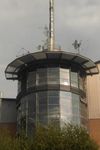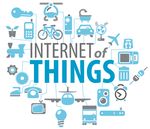LORA WHITE PAPER PROJET NPR : LPWAN-VPN - PARTNERS AUTHORS - ELVEXYS
←
→
Page content transcription
If your browser does not render page correctly, please read the page content below
LoRa White Paper
Projet NPR : LPWAN-VPN
Partners
Authors
Cyril Vallélian Collaborateur scientifique HEIA-FR
Loïc Bassang Collaborateur scientifique HEIA-FR
Version 1.0
03.04.20182/8
LPWAN-VPN PROJECT DESCRIPTION
LPWAN Introduction
LPWAN stands for “Low-Power Wide-Area
Network”. In short, LPWAN technologies are
wireless (radio) technologies that have the
following characteristics:
• Require little power (“low power”) for end
devices, thus extending battery life
• Transmission of information over large
distance (“long range”)
• Limited data transmission speed and
volume
• Low cost hardware
LPWAN is a hot topic in 2018, due to the emerging
“Internet of Things” (IoT) trend. LPWAN
technologies unlocks new markets and offers many
IoT applications like:
• Smart City https://ayehu.com/how-the-internet-of-things-will-complicate-
• Electricity grid monitoring incident-response/
• Agricultural monitoring and control
• Building automation
• Etc.
LPWAN-VPN Project
The LPWAN-VPN project is a NPR (“Nouvelle Politique Régionale”) project from the Canton Fribourg, which is
a promotion program to increase the creation of added value in areas like “Innovation Business”, “Territorial
Innovation” or “Touristic Innovation”.
This project aims to choose a LPWAN technology to set up a private LPWAN network. The companies
collaborating on this project are the following:
• Infoteam https://www.infoteam.ch
• Pronoó https://www.pronoo.ch
• MC-Monitoring www.mc-monitoring.com
• HEIA-FR https://heia-fr.ch
The project system requirements led to the choice of LoRa / LoRaWAN technology. This document presents
the following topics:
• LoRa technology introduction
• LoRa architecture choices made in this project
• Indoor coverage test results made in the HEIA-FR building
• Presentation of the pilot phase made in collaboration with Sierre-Energie
This document aims to globally describe the project and its results. More details can be found in the report.3/8
LORA/LORAWAN TECHNOLOGY
LoRa is a proprietary radio modulation technology It includes messages format (headers, payload, etc.)
used in LPWAN networks. The LoRa technology and devices role definition.
defines the radio part of the communication (layer
Unlike LoRa, LoRaWAN is an open protocol and is
1) and is responsible for providing low-power and
supported by a non-profit association called LoRa
long-range communication.
Alliance.
LoRa intellectual property is patented by Semtech.
Other manufacturers can also build LoRa radio
chipsets but must pay a license fee to Semtech.
On top of the physical layer implemented on LoRa
chipsets is the LoRaWAN protocol. LoRaWAN
defines the communication protocol to be used by
the Application and for each specific device class.
http://www.techplayon.com/lora-technology-benefits-application/
The LoRaWAN infrastructure is composed of the following elements:
Source : What is LoRaWAN (LoRa-Alliance Whitepaper)
End Nodes LoRa end points are the sensors or application where sensing and control takes place.
LoRa Gateways End nodes communicate with the gateways (antennas) using LoRa radio technology (and
LoRaWAN for the upper layer). Unlike cellular, end nodes are not associated with any
gateway. Instead, a node simply sends its data and hopes that one or more gateways
receives it. Each gateway that received the data then forwards it to the Network Server.
Network The Network Server (NS) is connected via IP (3G / Ethernet) with each gateway and the
Servers communication is secured with TCP/IP SSL (AES-128 encrypted). The NS provides all the
system intelligence. Its first task is to handle uplink data received from the gateways (de-
duplication). It performs security checks and can send acknowledgements to the end
nodes. The NS also represents an intermediary element between the node and the
Application servers. The communication here is also secured with TCP/IP SSL.
Application Applications are the final destination the end nodes communicate with. It is a piece of
software running on an application server. Typically, it could be an application with a REST
API that receives and handles end devices packets and reacts to them in many different
ways depending on their nature. The possibilities here are endless and depends on the
intended end devices goal.4/8
PROJECT LORA ARCHITECTURE CHOICES
To perform practical tests of LoRa (including coverage test), an architecture has been defined after testing and
comparing multiple solutions for each architecture component. This page describes the architecture choices.
Network Architecture
The following network architecture describes the architecture used in this project. The gateways connect to
Infoteam VPN gateway (via 4G or wired connection), to have secure connectivity with the Network Server and
the Application Server installed in the HEIA-FR.
Gateways
End devices
(LorixOne)
Swisscom 4G
Infoteam VPN
gateway
Gateways
Internet
traffic
HEIA-FR Network
Server & Application
LAN Server
VPN Tunnel
End Device
The end-device should allow to perform functional and coverage tests. It needs to provide a way
for quickly verifying if data with geo-localization can be sent. The “Adeunis RF Field Tester” end
device fulfills these requirements. It can be configured in many ways (LoRa parameters, sending
period, GPS, etc.). It is really useful for testing purposes as the data sent includes its GPS location
as well as radio characteristics like the RSSI (Received Signal Strength Indication) for example.
LoRa Gateway
The main constraints for the choice of the gateway are the price and the outdoor
resistance. The LoRa gateway selected for this project is the Swiss-designed
LorixOne, which is IP65 certified (outdoor usage), supports PoE and executes fully
customizable and open-source operating system (Linux Yocto).
LoRaWAN Network Server
To implement a private LoRa network and have control over it, an open-source solution is best. It should also
be mature and modular to allow scalability. For this reason, the open-source NS known as “Brocaar LoRa
Server” has been selected for the project. It offers good scalability, is modular and well documented.
Application Server
Brocaar NS allows to configure “HTTP Integration” which can be used to end received data directly to an HTTP
application. The application can then process the data (store it in a database, raise an alarm, etc.). For this
project, a NodeJS application has been developed to handle the received packets.5/8
HEIA-FR BUILDING COVERAGE TEST
To test our custom LoRa infrastructure, it was first Swisscom LoRa network also gives good results, but
installed in the HEIA-FR with a gateway on top of the the receiving power of the measurements were not
HEIA-FR telecom tower (pictures below). as good as our infrastructure’s results. This is due to
larger distances from the antennas.
The goals were to validate that the infrastructure
was functional but also perform indoor and outdoor
coverage test. The indoor test procedure was also
replicated using Swisscom LoRa network to
compare the results.
The results of our infrastructure demonstrate that
we can easily cover a large building (190m wide and
30m high) with a gateway on the top.
HEIA-FR LoRa infrastructure results
Swisscom LoRa infrastructure results6/8
SIERRE-ENERGIE PILOT
Context
To test our private LoRa infrastructure in a realistic
environment, the energy supplier “Sierre-Energy”
agreed to take part to a pilot phase. Their typical use
cases for LoRa include electrical stations monitoring
with temperature/humidity sensors and electrical
https://www.sierre-energie.ch/services-
measurements (voltage, electric current, etc.).
industriels/zones-desserte-36.html
These data need to be sent to a central server for
further processing.
Electrical stations are distributed in Sierre and its
surroundings villages, as seen in the serving area
map on the right. LoRa represents a good candidate
for this use case, as the areas to cover are large and
devices don’t need to send a lot of data and don’t
need to send them very often.
The city of Sierre is also very interesting, in terms of
topology with the “Vallée du Rhône” and the
mountains/hills that isolate parts of the serving
area.
Infrastructure
The three LorixOne LoRa gateways have been
installed in the following locations:
Chermoran
Itagne
Courja
Sources images 3D : Images ©2017 Google, DigitalGlobe, Landsat / Copernicus, Flotron / Perrinjaquet, Data SIO, NOAA, U.S. Navy, NGA,
GEBCO, Données cartographiques ©2017 Google7/8
SIERRE-ENERGIE RESULTS
Once the gateways installed, the next step was to Here are the statistics that can be produced from
evaluate the coverage provided by the 3 antennas. this set of data:
As the covered area is supposed to be very large,
• Measurements received by
three LoRa end devices have been placed in service
o Itagne: 1567 (67%)
vehicles. These end devices were configured to send
o Chermoran: 2288 (98%)
their current GPS location as well as radio
o Courja: 201 (8%)
characteristics every 10 minutes.
• Longest distance: 17.5km (Thyon)
All these data were stored in a database to perform
The gateway placed in Chermoran is very effective,
coverage mapping. As these vehicles travel all day
with 98% of the packets received. Itagne gateway is
long through Sierre, it provided a good overview of
also a good addition to Chermoran, as it is closer to
the coverage.
the center of Sierre.
Between the 07.11.2017 and the 31.12.2017 (55
Courja gateway was not very effective, because of
days), a total of 7214 packets have been received
its bad positioning (behind a hill and in a valley).
from the three end devices. After filtering all the
packets coming from the Sierre-Energie parking,
2352 packets remain.
The map below illustrates the areas where packets were received.
Chermoran
Itagne
Courja8/8
CONCLUSIONS
Sierre-Energie Pilot conclusion As seen in the results, the gateway with the best line
of sight over the area (Chermoran) is the one with
The pilot results are really good and encouraging, as the best results (98% of the packets received).
only three antennas (gateways) were used
(including the Courja gateway that was almost The pictures below illustrate that most of the
useless). The results analysis points out the serving area is covered. This map is only an
importance of gateway positioning. Performing inaccurate representation of all the data received by
topology analysis of the area to cover is mandatory. the gateways, but it provides a good overview of the
measurements and of the approximate coverage
To best place the gateways, the most important area.
parameter to consider is the “line of sight”. The
gateways need to “see” the maximum of the area.
The best way to achieve line of sight is by placing the
gateways in height (buildings, towers, mountains,
etc.).
General conclusion
The goal of the project, which was to set up a private LPWAN network, is achieved. As shown in the results,
LoRa/LoRaWAN technology is well suited for long-range communications and a good global coverage can be
obtained with a few gateways.
Achieving long-rang transmission and low-power has a price: the data speed rate. LoRa has been designed to
send a very small number of short packets a day. However, a lot of real-world situations don’t need to send a
lot of data at high speed rate. The typical use case is a periodic sending of sensors values (every x minutes) to
a central server for further analysis/monitoring. A lot of other use cases are also well suited for LoRa
technology.You can also read



























































